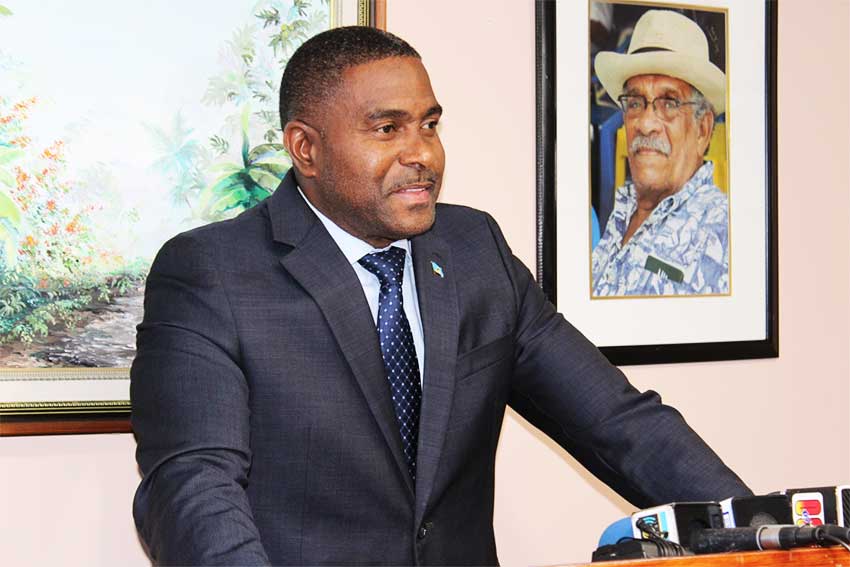SAINT LUCIA is not out of the woods yet, despite Senator Ubaldus Raymond’s announcement Tuesday that the European Union (EU) has taken the country off its ‘black list’ of countries not doing enough to crackdown on offshore avoidance schemes.
“We have activated the Ministry of Finance, particularly the Department Of Finance and the Inland Revenue Department to tackle the issues that the EU raised. Today, I am very pleased to report to the nation that St. Lucia, through the commitments that have been made to the EU in addressing their concerns, as it relates to their tax matters, that St. Lucia was moved from the black list to the grey list. I think this is something we should be proud of,” Raymond said.

Raymond, a Minister in the Ministry of Finance, explained that St. Lucia’s removal from the black list to the grey list, as of this week, means that his government had agreed to abide by the EU’s regulations pertaining to the tax system that it wants.
Further, he said, the government was given time to make the necessary adjustments to its tax system as indicated by the EU.
“What does being on the grey list mean? It means that the commitments we said we will undertake as a country, we will be given some time to meet these commitments. And I know that the Inland Revenue Department and the Ministry of Finance are working very hard to ensure that we deliver at the right time. What we are working on right now, we are ensuring that we are removed from that grey list,” Raymond said.
But what exactly were the issues the EU raised with the Government of St. Lucia pertaining to its tax system that the government, after months, has finally decided to rectify?
Raymond did not say what these issues were when questioned. However, he stated that the EU assesses the tax regimes of jurisdictions and determine whether they fall in line with EU standards.
“Not that our tax regimes may be wrong, or hurtful, or discriminatory, but based on the EU standard they would say make adjustments to fit their standard,” Raymond said , adding that that does not mean something is inherently wrong with St. Lucia’s tax system our tax system.
“We understand there are regulations, local, regional and international and the (EU) Code of Conduct is one of the regulations that look at non-corporate jurisdictions for tax matters,” Raymond said.
The EU did send a letter to all jurisdictions on its black list explaininmg its decision and what the countries can do to be de-listed.
The EU also explained that the new list it compiled last year that included St. Lucia was compiled through a three-step process, including the pre-selection of 216 countries worldwide using more than 1,600 indicators and that all jurisdictions chosen for screening were formally contacted, to explain the process and invited to engage with the EU.
“We did not fall short when we put our taxes together. We looked at our jurisdiction. We looked at the regional body that we are part of, the OECS. We looked at the regulations that govern us as a jurisdiction but now we have to look even further at the regulation from the EU, what the EU wants and what the EU does not want and generally what they don’t want they would point out those things to us and tell us make adjustments accordingly. That is exactly what it is. It is not that our tax system is bad. It doesn’t suit them,” Raymond said as way of further explanation as to why St. Lucia was black listed.
Raymond meanwhile took the opposition to task for criticizing the government for not making a commitment to undertake the issues raised by the EU last year that resulted in the country being blacklisted.
He said St. Lucians should be proud of the government for taking less than two months to be taken off the black list and put on the grey list.
However, Opposition Leader Philip J Pierre said that while he is happy for the sake of the country that it was taken off the black list, he maintained that St. Lucia could have avoided the indignity of being on the black list for such a long time.
“If the government had heeded the calls of the Opposition for immediate action, this could have been avoided. Being on the grey list means that the country still has issues with the EU Anti-Tax Avoidance Standards, but has committed to changes,” Pierre said.
He urged the Prime Minister to take all necessary steps to ensure that St. Lucia enters into immediate dialogue with the EU to avoid further embarrassment.
“It is my hope that the government has learnt its lesson and that the Opposition is not to be ignored or victimized,” Pierre said in a statement on social media.







![Attendees at the UHC logo and website launch [Photo credit: GOSL]](https://thevoiceslu.com/wp-content/uploads/2026/02/Attendees-at-the-UHC-logo-and-website-launch-380x250.jpg)






![Remnants of an alleged drug boat blown up in a lethal strike by the U.S. military last week surfaced off Canouan on Saturday [Photo credit : St Vincent Times]](https://thevoiceslu.com/wp-content/uploads/2026/02/Remnants-of-an-alleged-drug-boat-blown-up-380x250.jpg)
